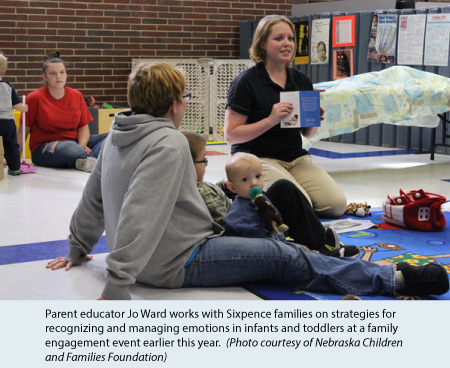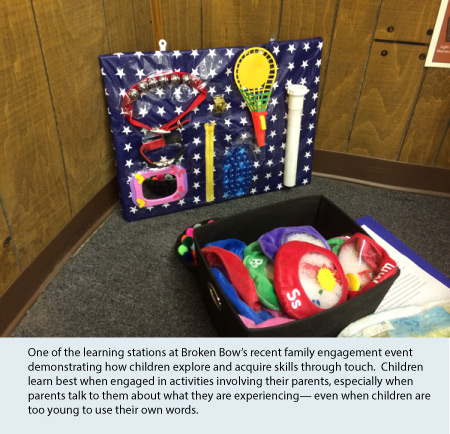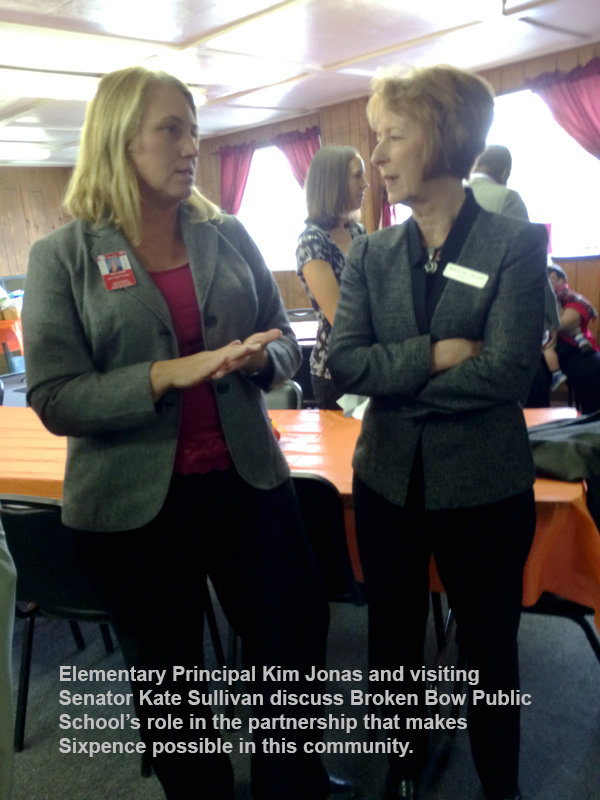It’s a beautiful, mild October afternoon in Broken Bow—a good day to get out with kids, which suits Nancy Ferguson and her colleagues nicely, although no one is quite sure how many families to expect for today’s activity. The multipurpose rooms adjacent to the Tumbleweed Café aren’t the usual meeting place for these parent-child socializations—they’re usually held at the public school downtown—so it’s gratifying when parents with infants and toddlers in tow begin to trickle steadily in. “In rural areas, you have to be creative about how you provide services,” says Ferguson, executive director of Central Plains Center for Services. In the present case, that means being flexible, using the resources at hand to their best advantage. Sure enough, the rooms are soon filled with the noises of children busily exploring the activity stations that Nancy’s team of parent educators set up in advance.
Today’s program is all about learning through the sense of touch. But to kick things off, there’s a group song. Parents, program staff and children clap and sing their way through a lively tune in which each child is welcomed by name to the day’s activities. When the song ends, the fun really begins. Parents and children move from one activity station to another, playing and experimenting with a wide variety of shapes and textures: soft foam alphabet letters, buttons and zippers, dials and knobs, things that are wiggly, things that are shiny and things that turn round and round and round. And, of course, there are lots and lots of brightly colored board books scattered about for the kids and parents to page through together.

On the face of it, it’s a grand time for the kids…but the real work going on here is all about teaching the parents how to be the caregivers and educators their children need.
Like the majority of Sixpence sites throughout the state, Broken Bow’s program focuses on coaching parents to become skilled in guiding the early development of their infants and toddlers, especially those who face significant risk factors that can threaten their ability to thrive as lifelong learners. In Broken Bow, the local Sixpence partnership connects families with early childhood specialists who are trained to model developmentally positive interactions with infants and toddlers, and teach those techniques to the parents.
Throughout the event, parent educators circulate among the families as the children play at the activity stations, talking about how sensory experiences like touch play an important part in the emergence of learning skills as a whole. Each activity station is constructed from materials easily available at home. Children who develop fine motor skills through manipulating age-appropriate objects in their environment (books, crayons, paintbrushes, and so on) are likely to be better prepared and more confident in exploring and learning from their surroundings. Their parents, in the meanwhile, are learning how to gently encourage and guide that process so they can support their kids’ skill growth at home or wherever opportunities for learning present themselves.
But why is parent education even necessary? Isn’t good parenting innate? Even families with a wealth of resources and social supports at their disposal encounter significant challenges when it comes to creating a safe, healthy and stimulating environment for their youngest kids. But more and more parents find themselves facing that challenge without those networks of support, particularly when it comes to their understanding of children’s earliest developmental needs.

Families that face significant insecurities in terms of education, income and social connectedness struggle when it comes to providing the kinds of interactions and environments that lead to the formation of confidence, emotional attachment, foundational language and cognitive skills in their infants and toddlers. Sixpence offers resources to families that can mitigate the effects of these factors in their children’s lives, help parents better meet their kids’ developmental needs during the crucial infant and toddler years, and put them on better footing to thrive alongside their peers when it comes time for them to enter kindergarten.
Today’s event has turned out to be a very well-attended, and there are even a few unfamiliar faces—Senators Sullivan, Kolowski and Haar are here to learn more about why parent education programs like this one are widely recognized as a highly effective strategy for building parental competence and family resilience overall.
This is particularly true when programs are well designed and incorporate clearly defined, measurable goals and close ties to other resources to provide the broadest possible benefit for families in the community.
 Nancy Ferguson points out that she and her colleagues feel strongly that all children in their community – whether or not they’re participants in Sixpence – should have the resources they need for a healthy, developmentally positive start in life. She's particularly proud of how the Sixpence partnership and related programs in Custer County work in tandem to connect individual families with the services that will help them the most. It calls for flexibility, efficiency and creativity — and a group of parent educators and staff who meet the meet the high standards of professionalism both Sixpence and its individual partners stand for. As in similar programs throughout the state, these professionals have to be highly competent and trusted partners of the families with whom they work, as well as skilled administrators who understand how local and state-level service systems function in tandem.
Nancy Ferguson points out that she and her colleagues feel strongly that all children in their community – whether or not they’re participants in Sixpence – should have the resources they need for a healthy, developmentally positive start in life. She's particularly proud of how the Sixpence partnership and related programs in Custer County work in tandem to connect individual families with the services that will help them the most. It calls for flexibility, efficiency and creativity — and a group of parent educators and staff who meet the meet the high standards of professionalism both Sixpence and its individual partners stand for. As in similar programs throughout the state, these professionals have to be highly competent and trusted partners of the families with whom they work, as well as skilled administrators who understand how local and state-level service systems function in tandem.
There’s a lot going on behind the scenes that makes today’s event in Broken Bow possible. As far as the families are concerned, though, it’s all about touch—and learning how children experience and explore the differences between rough and smooth, rigid and squishy. It’s about parents and kids having fun together, and practicing how to build stronger bonds as a family. Complex skills–for both kids and parents—have very simple beginnings, and these families are right where they need to be to get that process started.


